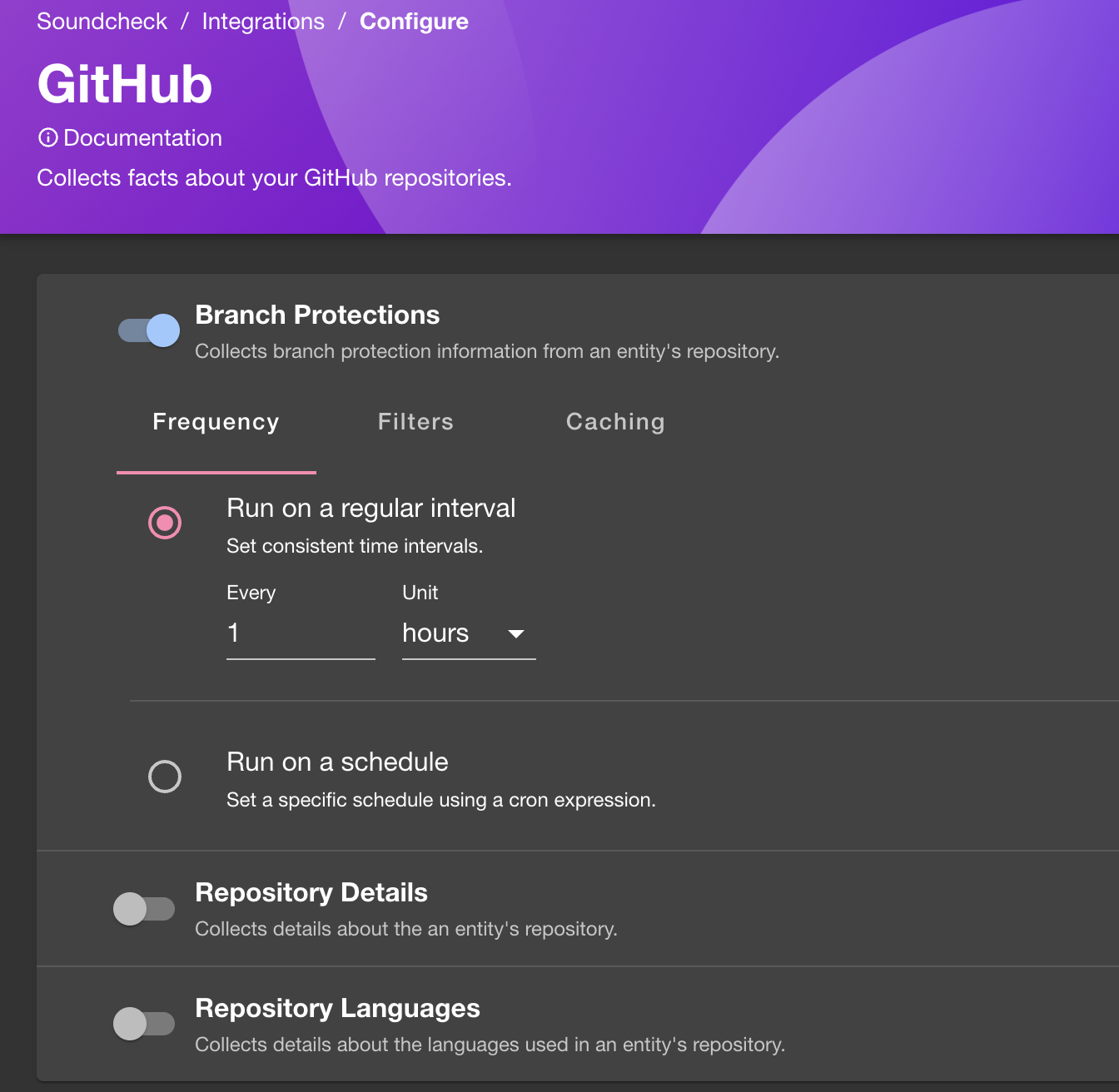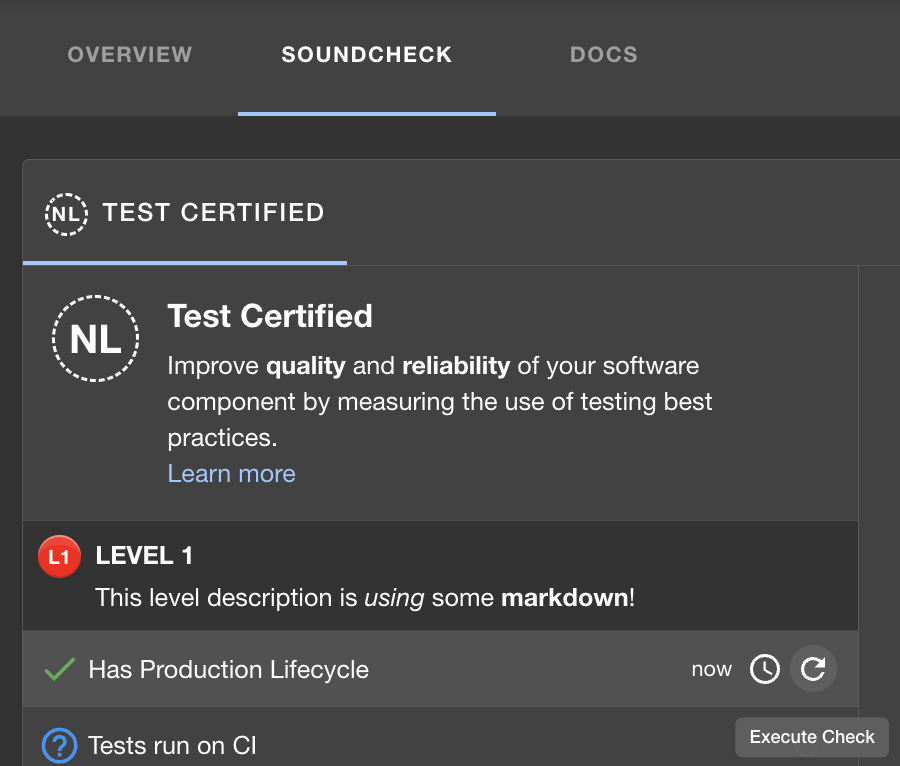Troubleshooting
This section covers the most common problems our first time adopters face and how to troubleshoot them. This guide covers the Open Source Backstage + Soundcheck and is not intended for Portal + Soundcheck (although some answers may be the same).
Why isn't my check running?
See the answer
There are 3 ways to make a check run. For testing your check you can use option 3, for a sustainable check execution use option 1.
NOTE: Executing a check is NOT the same as collecting a fact. Fact collection is what fetches data from an API and is subject to caching. Check execution is simply looking at that data and verifying if it satisfies the check criteria. However, after a new fact is collected the checks will execute.
Option 1 - Schedule fact collection (Recommended)
Each integration has its own documentation page - Github example here. In most cases to schedule a fact collection you just need to add following section to your YAML but please refer to the specific fact collector documentation. Once a new fact is collected, soundcheck will trigger all reliant checks automatically, so you don't need to schedule them separately.
---
frequency:
cron: '0 * * * *'
If you are using the No-Code UI, some integration can be configured to collect facts. Go to Soundcheck ->
Integrations and then click on Configure next to the collector you want to configure. From there you can schedule
fact collection like on the screenshot below.
NOTE: If the Configure button is disabled or not present that means you either configured the integration from the YAML or that this integration does not support No Code UI yet.

Option 2 - Schedule check (Not recommended)
We recommend you use the first option when possible. However, for some integrations, for example soundcheck, you will need to schedule the check. This is described in checks section here.
Option 3 - Manually run check (Recommended for testing only)
To manually trigger a check to run, navigate to a component page, next click on Soundcheck tab and then click the
Execute Check button.

I'm seeing Track pass percentages that don't align with the Check pass percentages in the Track
See the answer
Pass percentages are based on the number of entities that are applicable to the Check or Track in question.
As an example: say you have a Check that is applicable to 10 entities, and all 10 of them pass. Your pass percentage will be 100% for the Check. Say we then make a new Track and add only this Check to the Track, but we also set the Track's filters to make it apply to all 10 entities of the Check as well as an additional 40 entities. In this case the Track pass percentage will show as 10/50 = 20%, even though the Check's status on the Track insights page will show as 100%.
Why don't I see any history for my checks or certifications?
See the answer
In new versions, the history is enabled by default however you need to make sure you haven't disabled history.
I am seeing rate limit issues, what can I do?
See the answer
There is a couple of things to try when faced with rate limits.
Check your frequency settings
Depending on your needs you may tweak the frequency of the fact collection to reduce the number of requests being made. The trade off here is you will have data that is potentially stale. Refer to the specific collector on how to change the frequency. For example this is how you do it in Github Collector
Enable cache for the fact collector
Refer to the specific collector on how to do that. For example this is how you do it for Github Collector
Enable Rate limiting
You can enable limiting the amount of requests that soundcheck will make from a specific collector. It is highly recommended to also enable redis queues so that the limits apply across all pods.
Use API to submit check results
Normally soundcheck works in pull model, where it fetches facts on a schedule and then executes checks. Soundcheck also has an API that enables it to work in push model where other systems such as CI pipelines can push data to soundcheck.
You can either push new facts or push check results.
I have a lot of catalog entities and my Backstage instance is now slowing down, what can I do?
See the answer
Refer to the Scaling Backstage documentation.
I'm seeing high system resource usage, what can I do?
See the answer
- Ensure caching is enabled
Verify that caching is configured and active. Without persistent cache store, each Soundcheck instance will independently perform cache warming jobs and maintain its own in-memory cache. This can significantly increase the load on the database and consume additional system resources. Enabling caching allows all instances to share cache data efficiently and reduces redundant work. More details are available here.
- Allocate sufficient memory for Node.js old space
Soundcheck runs cache warming jobs that can be memory-intensive. These jobs may temporarily increase both memory and CPU usage, especially during initialization or when preloading large caches. To ensure stable operation, users should monitor CPU and memory utilization and adjust the Node.js memory limit as needed. For example:
export NODE_OPTIONS="--max-old-space-size=4096"
This allocates up to 4 GB of memory for the old space. Adjust the value based on available system resources and observed workload behavior. Regular monitoring and gradual tuning of this setting can help maintain optimal performance and prevent crashes caused by insufficient heap memory.
- Instrument system and application metrics
To gain deeper visibility into performance, instrument standard system, Node.js, and Soundcheck-specific metrics. Monitoring CPU, memory, garbage collection activity, cache hit rates, and job durations can help identify bottlenecks early and guide targeted optimizations.
Why can't I use all the filters available in YAML in the No Code UI?
See the answer
We are working on bringing the functionality parity to the No code UI. Check our release notes to see latest improvements.
Why am I getting errors with Isolated VM?
See the answer
Isolated VM version 5.0.1 works with node version 22. Isolated VM version 4.7.2 works with node version 20. Isolated VM version 4.6.0 works with node version 18.
If you're having issues with Isolated VM errors, check the version of Node you're using, and
manually pin the version of Isolated VM in your package.json to the appropriate version.
I'm seeing 'Cannot return null for non-nullable field' type errors on Soundcheck pages
See the answer
Soundcheck makes use of Redis caching. If you encounter an issue with stale or incompatible data,
clearing the cache may help. You can restart your entire Redis instance, or if you'd like to clear
only the Soundcheck cache entries, you can use the redis-cli command line tool:
redis-cli KEYS "soundcheck:*" | xargs redis-cli DEL
This will delete all keys that start with soundcheck: in your Redis instance (which is to say,
all Soundcheck cache entries), causing Soundcheck to
(passively) repopulate the cache with the correct types.
I'm seeing styling issues in the UI
See the answer
The new Soundcheck UI now has a hard dependency on Backstage UI. Ensure you are using the latest version and are importing the proper CSS files.
My custom theme is no longer applying correctly to Soundcheck
See the answer
The new Soundcheck UI uses Backstage UI, which has a different approach to theming.